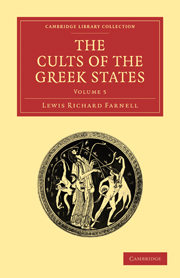Book contents
- Frontmatter
- PREFACE
- Contents
- LIST OF PLATES IN VOL. V
- CHAPTER I CULTS OF HERMES
- CHAPTER II CULT-MONUMENTS OF HERMES
- CHAPTER III THE IDEAL OF HERMES
- CHAPTER IV CULTS OF DIONYSOS
- CHAPTER V DIONYSIAC RITUAL
- CHAPTER VI CULT-MONUMENTS OF DIONYSOS
- CHAPTER VII IDEAL DIONYSIAC TYPES
- CHAPTER VIII CULTS OF HESTIA
- CHAPTER IX CULTS OF HEPHAISTOS
- CHAPTER X CULTS OF ARES
- CHAPTER XI MINOR CULTS
- INDEX
- Plate section
CHAPTER VIII - CULTS OF HESTIA
Published online by Cambridge University Press: 03 May 2011
- Frontmatter
- PREFACE
- Contents
- LIST OF PLATES IN VOL. V
- CHAPTER I CULTS OF HERMES
- CHAPTER II CULT-MONUMENTS OF HERMES
- CHAPTER III THE IDEAL OF HERMES
- CHAPTER IV CULTS OF DIONYSOS
- CHAPTER V DIONYSIAC RITUAL
- CHAPTER VI CULT-MONUMENTS OF DIONYSOS
- CHAPTER VII IDEAL DIONYSIAC TYPES
- CHAPTER VIII CULTS OF HESTIA
- CHAPTER IX CULTS OF HEPHAISTOS
- CHAPTER X CULTS OF ARES
- CHAPTER XI MINOR CULTS
- INDEX
- Plate section
Summary
Among the minor cults of Hellas that of Hestia specially arrests our attention for the light that it throws on a certain primitive phase of religious thought as well as on a special chapter in the history of primitive culture. Being the least anthropomorphic of Hellenic divinities, she appears to be the product of that period of animistic belief that may everywhere have preceded a more precise anthropomorphism. At least, although Homer is silent about her, we can scarcely doubt her great antiquity. It has long been recognized that we must be cautious in the deductions we draw from Homer's silence. He may have known of her cult, and have found her figure inappropriate to the purposes of a divine drama. He uses the term ἱσΤίη indeed merely as a common noun, designating the ‘hearth’ or the ‘fire of the hearth’ but the word has at times a certain sacred association and value for him; for he regards the hearth as the natural place for the suppliant and as a thing that might serve as the pledge of an oath.
But the first literary record of the personal goddess is found in the Theogony of Hesiod, who speaks of her as the eldest daughter of Rhea and Kronos, and sister of Demeter. He does not, however, describe her nature or functions, and the first witnesses to these are certain passages in the Homeric Hymns.
- Type
- Chapter
- Information
- The Cults of the Greek States , pp. 345 - 373Publisher: Cambridge University PressPrint publication year: 2010First published in: 1909



